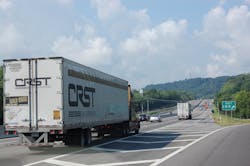Request granted: CRST permit holders given team driver status
The Federal Motor Carrier Safety Administration has granted CRST Expedited (CRST) an exemption from the provision in the federal code that requires a commercial learner’s permit (CLP) holder to always be accompanied by a commercial driver’s license (CDL) holder in the front seat during behind-the-wheel training on public roads. CRST had requested that the accompanying CDL holder have the option of being in the sleeper portion of the cab while the trainee is driving.
The exemption, published Friday, enables CLP holders to drive as part of a team and have the same regulatory flexibility as CRST team drivers with CDLs. The Federal Motor Carrier Safety Administration granted such an exemption to C.R. England last year.
FMCSA reported that the agency analyzed the exemption application and the public comments and has determined that the exemption, subject to the terms and conditions imposed, will achieve “a level of safety that is equivalent to, or greater than, the level that would be achieved absent such exemption,” the standard threshold for granting such requests.
In the request, CRST explained that compliance with the CDL rule places them in “a very difficult position” regarding how they return the CLP holder who has passed his or her skills testing back to their state of domicile to obtain their CDL.
The two options for handling the situation have been “simple, yet costly,” according to the application: Either CRST sends CLP holders to their home state by public transportation to obtain the CDL and hopes the drivers return to CRST for employment; or CRST sends CLP holders back as passengers on its trucks.
CRST also maintained that the only difference between a CLP holder who has passed the CDL skills test and a CDL holder is that the latter has received the actual CDL document from a state driver licensing agency.
FMCSA received 56 comments on the application, with most of the comments opposed to the CRST request coming from truck drivers, driver-trainers, and other individuals. Three industry groups—the Advocates for Highway and Auto Safety (Advocates), the Owner-Operator Independent Drivers Association (OOIDA), and the International Brotherhood of Teamsters (IBT)—also opposed the exemption request.
These opponents argued that that it is not safe for a CLP holder to operate a CMV without the supervision of a CDL driver-trainer in the front seat of the truck, and that FMCSA should not lessen safety protections so that a trucking company can make more profit.
The Iowa Motor Truck Association (IMTA) supported the exemption request, and echoed CRST’s reasoning.
In granting the request, FMCSA notes that if these CLP holders had obtained their training and CLPs in their state of domicile, they could immediately obtain their CDL and begin driving without any on-board supervision. There is no data showing that having a CDL holder accompany a CLP holder who has passed the skills test improves safety, according to the agency.
The exemption runs for two years, although FMCSA can revoke it should CRST “experience any deterioration of their safety record” because of the waiver.
About the Author
Kevin Jones 1
Editor
Kevin has served as editor-in-chief of Trailer/Body Builders magazine since 2017—just the third editor in the magazine’s 60 years. He is also editorial director for Endeavor Business Media’s Commercial Vehicle group, which includes FleetOwner, Bulk Transporter, Refrigerated Transporter, American Trucker, and Fleet Maintenance magazines and websites.
